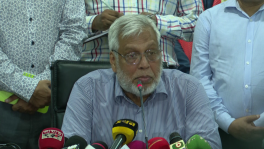Khasru pledges to bring arts-culture into mainstream of economy
The BNP leader said globally, handicrafts fetched a high price, but they had not been able to take advantage of this.

Stressing the need for working on the concept of the 'creative industry', BNP Standing Committee member Amir Khasru Mahmud Chowdhury today (28 August) pledged to integrate arts and culture from rural areas into the country's economic mainstream if his party comes to power.
"To utilise our potential, we must take advantage of the demographic dividend. For this, along with education, everyone must build themselves up with skills," he said while addressing a youth-focused event at a city hotel.
The former minister said democracy in politics was not enough and explained that if the economy could not be democratised, no politics would work and democracy would be of no use, and emphasised that democracy should be established for all with equal rights and that a welfare state must be built.
Khasru said future activities in Bangladesh must reflect people's aspirations and reach remote communities and outlined the idea of the creative industry.
"This will include everyone in Bangladesh weavers, blacksmiths, potters, fine artists, designers, musicians all will be brought into the economy. For example, we have a wide variety of music like Bhawaiya, folk songs, Lalon songs but we have not yet brought them into the mainstream. Many forms of music in Bangladesh are disappearing," he said.
The BNP leader said globally, handicrafts fetched a high price, but they had not been able to take advantage of this.
To bring handicrafts into the mainstream economy, Khasru said, programmes for the creative industry would be introduced and artisans must be provided with the raw materials they needed, given assistance, and offered opportunities for branding and marketing platforms.
Citing Thailand's experience, he said, "When Thaksin Shinawatra was prime minister, we were taken to his country to see the 'One Village, One Product' model. They identified each village by its best product— this village produces one item well, another village another product. Then they supported its design, export and branding."
They advanced with such a plan. Like Amazon and Alibaba, they branded their products, he said.
Khasru said people in rural areas would be provided with platforms enabling them to export products directly.
"They will not need to come to Dhaka or Chattogram. We enjoy drama and theatre, but we cannot promote it. We have not been able to monetise it. Yet Dhaka's theatre could become like London's, and the same could happen in Chattogram. This is not just entertainment— if we can do it, huge employment will also be created. These too are part of the economy. The economy is not only about the garment sector or manufacturing. In the past, we failed to make use of this," he added.
On the borderless nature of culture, he said, "Music has no boundaries. From Bangladesh, we listen to English or Spanish songs. Today's young generation is always immersed in Korean dramas. This shows that arts and culture have no frontiers. They must be brought into the mainstream economy."
At the same time, he expressed his expectation to spread IT businesses across the country, pointing out Bangladesh's demographic advantage.
"As a country, we are enjoying the demographic dividend. Compared to Western nations, we have more young and working-age people. This is our asset. But it will only become a true asset when we can monetise it. For that, we must work— along with education, skills must be enhanced. Due to lack of skills, we are failing to utilise the demographic dividend," he said.



 Keep updated, follow The Business Standard's Google news channel
Keep updated, follow The Business Standard's Google news channel
















